Social Innovation
The Bunnings effect and renovation during COVID
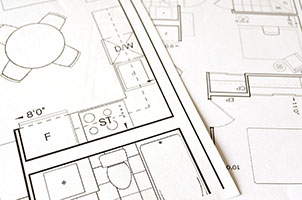 During COVID-19 Australians took to renovating like never before. According to Realestate.com.au, the average spend on renovation was around $63,000. In the ACT the average spend was $58,5001. Most of the renovations have focused on general living areas, which makes sense given families have been spending more time together and combining this with work and schooling. The statistics also show that kitchen and bathroom renovations continue to be the most expensive.
During COVID-19 Australians took to renovating like never before. According to Realestate.com.au, the average spend on renovation was around $63,000. In the ACT the average spend was $58,5001. Most of the renovations have focused on general living areas, which makes sense given families have been spending more time together and combining this with work and schooling. The statistics also show that kitchen and bathroom renovations continue to be the most expensive.
An interesting trend in the midst of this has been investors updating their investment properties. The key difference is that many owners are doing the renovations themselves - not only to save money but to keep busy during periods of restrictions. When you take into account that many of these houses were built during the 1980s the types of renovation you can do may be limited unless you are talking about doing some major work.
10 Tips for updating your laundry
 The laundry is the workhorse of the family home, especially if you have a young family. It is also frequently the least accessible room in the house, designed as an afterthought rather than a priority.
The laundry is the workhorse of the family home, especially if you have a young family. It is also frequently the least accessible room in the house, designed as an afterthought rather than a priority.
Some of the common problems in laundries include
- Laundries are often tucked into narrow rooms with inadequate floor space especially for people who use walkers or wheelchairs.
- There can be insufficient task lighting - washers and dryers are often tucked away in poorly lit utility closets or dark spaces, making it hard to read dials.
- Top loading washing machines with rear-mounted controls can make them hard to reach, especially if you are short or using a wheelchair or walker.
- Cupboards are very often too high for many people.
- Knob door handles on cabinets are difficult to use if you have arthritis.
- Work counters that lack knee space make it difficult for someone in a wheelchair. There is also no space to sit if you have lots of sorting or folding to do.
5 Tips for renovating your living spaces
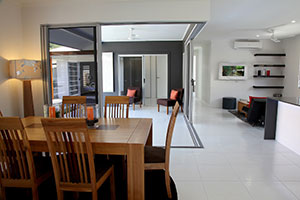 The coronavirus pandemic has highlighted the shortcomings in many house designs as people have spent more time at home, whether working from home, in lockdown, or homeschooling.
The coronavirus pandemic has highlighted the shortcomings in many house designs as people have spent more time at home, whether working from home, in lockdown, or homeschooling.
Over time, a single space in a house might need to work as a home office, teenage retreat, spare room for visiting relatives; or a bedroom for an ageing grandparent. There will also be periods in the lifetime of the house where it will need to be adaptable to changed capabilities in the family. For example, someone in the family may be on crutches, a toddler may be learning to walk, or as family members get older, they may have reduced mobility or vision. In multigenerational households, these could all be happening at the same time!
Kitchens – planning with tomorrow in mind
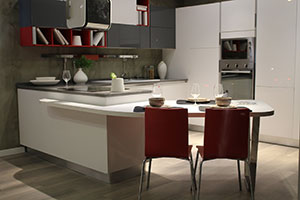 When it comes to renovating our homes we often think in terms of the here and now, rather than what we might need in 5, 10 or 20 years. Universal Design is a way of designing a space in such a way that it is functional and practical for all age groups, life stages and abilities. A 2017 Houzz & Home survey found that the kitchen is one of the commonest and most expensive rooms in the house to renovate. A kitchen design that is beautiful, functional and comfortable for all is a better long-term investment and means it can cater for the multigenerational family, including older grandparents and a family member with a disability. So, if you are planning a kitchen renovation here are a few things to consider.
When it comes to renovating our homes we often think in terms of the here and now, rather than what we might need in 5, 10 or 20 years. Universal Design is a way of designing a space in such a way that it is functional and practical for all age groups, life stages and abilities. A 2017 Houzz & Home survey found that the kitchen is one of the commonest and most expensive rooms in the house to renovate. A kitchen design that is beautiful, functional and comfortable for all is a better long-term investment and means it can cater for the multigenerational family, including older grandparents and a family member with a disability. So, if you are planning a kitchen renovation here are a few things to consider.
Universal Design - Home renovations that add real value
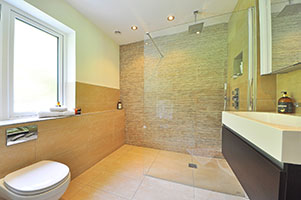 The Design Canberra Festival recently hosted a talk by well-known demographer, Bernard Salt, titled “Suburbia’s time in the Sun”. It invited viewers to ponder the question of whether the coronavirus was reshaping Australia’s urban life. As people have been forced to work from home, we have seen neighbourhoods come alive, local parks full of people playing and exercising and suburban coffee shops with queues out the door. Lifestyle has always been important to Australians and after being confined to our houses, many Canberrans have been grateful to have the relative spaciousness of suburbia.
The Design Canberra Festival recently hosted a talk by well-known demographer, Bernard Salt, titled “Suburbia’s time in the Sun”. It invited viewers to ponder the question of whether the coronavirus was reshaping Australia’s urban life. As people have been forced to work from home, we have seen neighbourhoods come alive, local parks full of people playing and exercising and suburban coffee shops with queues out the door. Lifestyle has always been important to Australians and after being confined to our houses, many Canberrans have been grateful to have the relative spaciousness of suburbia.
Good Design is Good Business
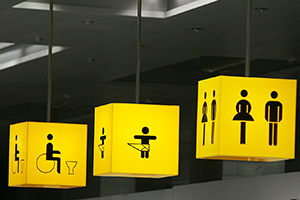 Have you ever sighed with relief when you saw the moving walkways at an airport, the thought of lugging heavy luggage after a long-haul flight seeming like a step too far? What a great design! However, there are plenty of examples out there where the user seems like a distant afterthought. Maybe you have wondered whether the instructions that come with flat-pack furniture were written by aliens? It’s not just instructions, think packaging - have you experienced the frustration of trying to open packaging that was supposed to be toddler-proof but also happens to be adult proof? What about electronics? Does it feel like you need an electronics degree just to operate your TV? It’s not just products, good or bad design affects your service experience as well. Maybe you felt like you weren’t treated like a normal customer just because you requested a vegan or gluten-free option?
Have you ever sighed with relief when you saw the moving walkways at an airport, the thought of lugging heavy luggage after a long-haul flight seeming like a step too far? What a great design! However, there are plenty of examples out there where the user seems like a distant afterthought. Maybe you have wondered whether the instructions that come with flat-pack furniture were written by aliens? It’s not just instructions, think packaging - have you experienced the frustration of trying to open packaging that was supposed to be toddler-proof but also happens to be adult proof? What about electronics? Does it feel like you need an electronics degree just to operate your TV? It’s not just products, good or bad design affects your service experience as well. Maybe you felt like you weren’t treated like a normal customer just because you requested a vegan or gluten-free option?
The Mullion Group – Canberra company helps global decision-makers take meaningful action on climate change
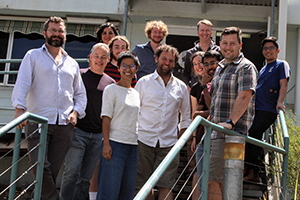 The Mullion Group is a software and consulting company supporting companies, countries and other organisations to operationalise systems for estimating environmental metrics. This small Canberra company employing around 14 staff is recognised internationally for their expertise in greenhouse gas inventory systems for the land sector.
The Mullion Group is a software and consulting company supporting companies, countries and other organisations to operationalise systems for estimating environmental metrics. This small Canberra company employing around 14 staff is recognised internationally for their expertise in greenhouse gas inventory systems for the land sector.
Hand in Hand: Making Healthcare Accessible
 Photo credit: Tracy Lee Photography“I can text you to make a Massage appointment.” Lynda Leigh tells me when I ask her how my Massage Practice – Therapy Masters supports her and her disability. Lynda, a leading rally competitor, is moderately to profoundly deaf, usually wears expensive hearing aids and lip reads to communicate with those around her. But once she is in a darkened treatment room, lying face down on the treatment table, with her hearing aids out – the way the world interacts with her - needs to change.
Photo credit: Tracy Lee Photography“I can text you to make a Massage appointment.” Lynda Leigh tells me when I ask her how my Massage Practice – Therapy Masters supports her and her disability. Lynda, a leading rally competitor, is moderately to profoundly deaf, usually wears expensive hearing aids and lip reads to communicate with those around her. But once she is in a darkened treatment room, lying face down on the treatment table, with her hearing aids out – the way the world interacts with her - needs to change.
When ridesharing isn't just sharing a ride - it's about caring
 What makes someone aiming for a career as a clinical psychologist start a ridesharing business? Emma Hamilton of YouGoCo said it was because she was aware of the impact unemployment has on people and if you have been out of the workforce for a long time getting back into employment can be really hard.
What makes someone aiming for a career as a clinical psychologist start a ridesharing business? Emma Hamilton of YouGoCo said it was because she was aware of the impact unemployment has on people and if you have been out of the workforce for a long time getting back into employment can be really hard.
Mental Health - Focus on the Nation's Wellbeing
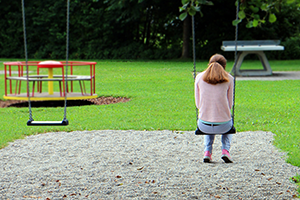 The World Health Organisation identified depression as one of the world’s biggest health issues in 2020. And that was before the coronavirus pandemic unfolded. The lockdown forced many of us to deal with issues of loneliness and isolation that many people in our society experience on a day-to-day basis regardless of pandemics.
The World Health Organisation identified depression as one of the world’s biggest health issues in 2020. And that was before the coronavirus pandemic unfolded. The lockdown forced many of us to deal with issues of loneliness and isolation that many people in our society experience on a day-to-day basis regardless of pandemics.
People suffering from mental health issues have always had to deal with the stigma attached and are often referred to as different or incompetent when in reality they are unwell. But this stigma leads to a range of issues with self-esteem, which only makes the problem worse. The coronavirus pandemic combined with a deadly bushfire season has bought this issue to the forefront in a number of ways.
Tackling social isolation using radio
 ArtSound FM, Canberra’s arts broadcaster, believes that radio technologies have a vital role to play in tackling loneliness and isolation among seniors.
ArtSound FM, Canberra’s arts broadcaster, believes that radio technologies have a vital role to play in tackling loneliness and isolation among seniors.
For several years, ArtSound’s Internet-streamed Senior Memories Network has provided tailored radio programs to seniors in several aged-care facilities in Canberra and Western NSW. The service, programmed and presented by volunteer seniors, provides older and disabled people with a source of entertainment and company. As the Covid-19 pandemic has forced these and many other locations to be locked down, older citizens have suddenly become increasingly isolated from their loved ones.
NOT FOR PROFIT/FOR PURPOSE TRENDS FOR 2019
 I’ve been working with For Purpose organisations for the past 10 years and I have seen many changes and challenges over that time. However over the last 18 months the pace, significant nature and impact of change has been quite surprising. A quick review of what other For Purpose and NFPs are experiencing clearly demonstrates that I’m not alone in thinking this. As of December 2018, there were 56, 650 registered charities and over 550,000 Not for Profit organisations in Australia – those that think that the status quo will remain in place, need to think again.
I’ve been working with For Purpose organisations for the past 10 years and I have seen many changes and challenges over that time. However over the last 18 months the pace, significant nature and impact of change has been quite surprising. A quick review of what other For Purpose and NFPs are experiencing clearly demonstrates that I’m not alone in thinking this. As of December 2018, there were 56, 650 registered charities and over 550,000 Not for Profit organisations in Australia – those that think that the status quo will remain in place, need to think again.
The good side of 'Business Unusual'
 The shutdown caused by the coronavirus pandemic has meant that for the first time many of us experiencing challenges associated with accessing limited or highly desired goods and services, isolation and using technology for all communications. It has challenged our well-established ideas of what it means to be connected to family, friends and employment. And it has us now all questioning whether things can be done differently and perhaps, even better.
The shutdown caused by the coronavirus pandemic has meant that for the first time many of us experiencing challenges associated with accessing limited or highly desired goods and services, isolation and using technology for all communications. It has challenged our well-established ideas of what it means to be connected to family, friends and employment. And it has us now all questioning whether things can be done differently and perhaps, even better.
The last few months have shown how the need to thrive and survive has forced businesses and individuals to think outside the square and show their innovative and creative sides. Restaurants have not only had to switch to offering takeaway only but they have come up with new ways of ordering and providing contactless pick-up and delivery, as have pharmacies and even health practitioners had to re-think how they deliver their services. Education and entertainment are taking place in virtual classrooms and most workers are holding meetings and even conferences online with participants spread around the country and world. Families are celebrating special events while physically separated and entertainers are hosting collaborative concerts while in different states and even countries. We have all had to rethink the way we engage with things and each other – we have had to in many ways redesign the environment we are working and playing in.
Comparing your options for retirement living
 Until now the retirement living industry has been shrouded in confusion, complexity and misconceptions, particularly around associated fees and costs. Prospective purchasers have long
Until now the retirement living industry has been shrouded in confusion, complexity and misconceptions, particularly around associated fees and costs. Prospective purchasers have long
been overwhelmed by having the daunting and often extremely time-consuming task of having to compare one retirement village to another.
As the first and to-date only website helping older Australians to comprehensively compare retirement living accommodation across the country, CompareVillages does the legwork for you and makes real comparison possible.

